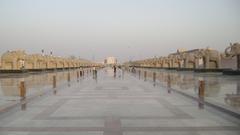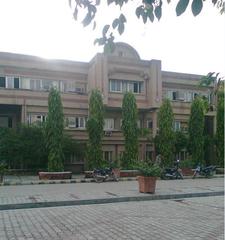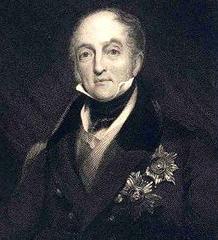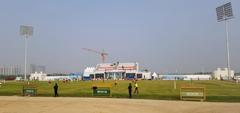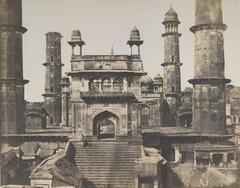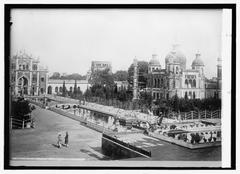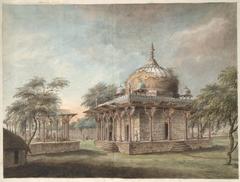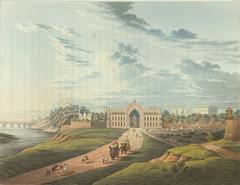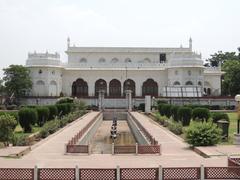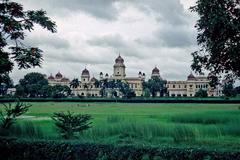Jama Mosque Lucknow: Visiting Hours, Tickets, and Historical Significance
Date: 04/07/2025
Introduction
The Jama Mosque in Lucknow is a magnificent symbol of the city’s rich Islamic heritage and architectural excellence. Built in the 19th century under the patronage of Nawab Mohammad Ali Shah and completed by Malika Jahan Begum, the mosque reflects the cultural aspirations of the Nawabs of Awadh during an era of remarkable Indo-Islamic artistry (Wikipedia; Explore Our India). Characterized by its blend of Mughal, Persian, and Awadhi styles—highlighted by yellow sandstone, 260 intricately carved pillars, and 15 domes—it stands as a vibrant center of religious and communal life in Lucknow (Yometro; Lucknow Pulse).
This guide offers a comprehensive overview, including historical background, architecture, visiting hours, ticket details, travel tips, accessibility, and nearby attractions, ensuring you have all the information necessary for a meaningful visit.
Table of Contents
- Origins and Patronage
- Historical Context: Lucknow and the Nawabs
- Architectural Features and Restoration
- Religious and Social Significance
- Visiting Hours and Tickets
- Travel Tips and Nearby Attractions
- Photography and Events
- Accessibility and Etiquette
- FAQs
- Preservation and Current Status
- Final Tips for Visitors
- References
Origins and Patronage
The foundation of Jama Mosque was laid in 1839 CE by Nawab Mohammad Ali Shah with the ambition of surpassing even the famous Jama Masjid of Delhi (Wikipedia; Explore Our India). After his death in 1842, his wife, Malika Jahan Begum, assumed responsibility for its completion. Despite financial and social challenges, the mosque was finished in 1845, albeit on a reduced scale compared to the grand original vision (Tornos India).
Historical Context: Lucknow and the Nawabs
Lucknow’s development as a cultural and architectural hub is closely linked to the Nawabs of Awadh. The city flourished under their rule, becoming renowned for its syncretic culture and cosmopolitanism (Academia.edu). The construction of Jama Mosque during this golden era symbolizes the wealth and artistic sensibilities of the Awadhi court, and its placement in Husainabad situates it among other monumental landmarks like Bara Imambara and Rumi Darwaza (Lucknow Tourism).
Architectural Features and Restoration
Jama Mosque showcases a unique architectural synthesis:
- Materials: Built primarily of yellow sandstone, with Lakhuri bricks and lime plaster (Explore Our India).
- Facade: Eleven arches, with the central one being the most prominent.
- Pillars and Domes: Approximately 260 pillars support 15 domes, the three central domes being lotus-shaped—a hallmark of Awadhi style (Lucknow Pulse).
- Minarets: Topped with umbrella-like chhatris, revealing subtle Gothic influences (Tornos India).
- Ornamentation: Intricate stucco motifs, calligraphic inscriptions, and floral patterns.
Restorations have been carried out periodically, notably with a grant from the British in 1901, and the mosque is now protected by the Archaeological Survey of India (Wikipedia; Lucknow Tourism).
Religious and Social Significance
Jama Mosque is central to the religious life of Lucknow’s Shia Muslim community, especially for Friday (Juma) prayers and major festivals like Eid and Muharram (Lucknow Pulse). The mosque also played a significant role during the Indian Rebellion of 1857, when it served as a community rallying point.
Visiting Hours and Tickets
- Open Daily: 6:00 AM – 8:00 PM (timings may vary slightly; check locally during festivals or special events) (Yometro; Holidify).
- Entry Fee: No tickets required for entry. Photography inside may incur a nominal fee (typically INR 300) (Holidify).
- Dress Code: Modest clothing is required. Women should cover their heads, and all visitors must remove shoes before entry. Shoe racks are provided (TourTravelWorld).
- Non-Muslim Access: Non-Muslims may be restricted from entering the main prayer hall during prayer times or religious events; check current policies before visiting (Holidify; Trawell.in).
Travel Tips and Nearby Attractions
- Getting There: Located in Husainabad, about 6 km from Lucknow Junction Railway Station. Reachable by taxi, auto-rickshaw, or local bus (Trawell.in).
- Nearby Sites:
- Bara Imambara
- Rumi Darwaza
- Chhota Imambara
- Satkhanda
- Best Time to Visit: Early morning or late afternoon for pleasant weather and better lighting. January to April are ideal months (Yometro).
- Duration: Allocate 30 minutes to 1 hour for your visit. Combine with nearby sites for a fuller experience (TripHobo).
Photography and Events
- Photography: Permitted outside of prayer times and mainly in exterior areas. Always seek permission before photographing worshippers or interiors (Holidify).
- Festivals: The mosque is especially vibrant during Eid, Muharram, and Friday prayers, hosting large congregations and traditional rituals (Agate Travel).
Accessibility and Etiquette
- Accessibility: Ramps are available at main entrances, but expect some uneven surfaces in the courtyard. Assistance can be requested (Holidify).
- Etiquette:
- Dress modestly and cover your head if required.
- Remove shoes before entering.
- Maintain silence and switch off mobile phones in the prayer hall.
- Respect religious customs and avoid visiting during major prayer times for a quieter experience.
FAQs
Q: What are Jama Mosque Lucknow’s visiting hours?
A: Open daily from 6:00 AM to 8:00 PM.
Q: Is there an entry fee or ticket required?
A: Entry is free, but a photography fee (INR 300) may apply inside the mosque.
Q: Are non-Muslims allowed to visit?
A: Access to the main prayer hall may be restricted for non-Muslims, especially during prayers; check with local authorities.
Q: Can I take photographs inside?
A: Yes, with a fee and outside prayer times. Always ask for permission.
Q: Are guided tours available?
A: Yes, local guides can be hired for a deeper understanding of the mosque’s history and architecture (TourTravelWorld; Holidify).
Preservation and Current Status
The mosque is recognized as a Monument of National Importance and maintained by the Archaeological Survey of India (Wikipedia). Restoration efforts preserve its intricate stonework and historical integrity, while evolving visitor policies aim to promote cultural tourism without compromising religious sanctity (Lucknow Pulse).
Final Tips for Visitors
- Dress appropriately and respect all customs.
- Visit early or late for a peaceful experience and best photography conditions.
- Combine your visit with nearby historical sites for a richer itinerary.
- Use local guides for enhanced interpretation.
- Check festival dates and current access policies before planning your visit.
- Carry small change for shoe racks, photography fees, or donations.
References
- Explore Our India
- Wikipedia
- Agate Travel
- Yometro
- Holidify
- Tornos India
- Lucknow Tourism
- Vicky Flip Flop Travels
- Lucknow Pulse
- Trawell.in
- TourTravelWorld
- TripHobo
For more detailed guides, travel tips, and interactive maps, download the Audiala app and follow us on social media. Plan your journey with confidence and discover the soul of Lucknow through its enduring monuments.
